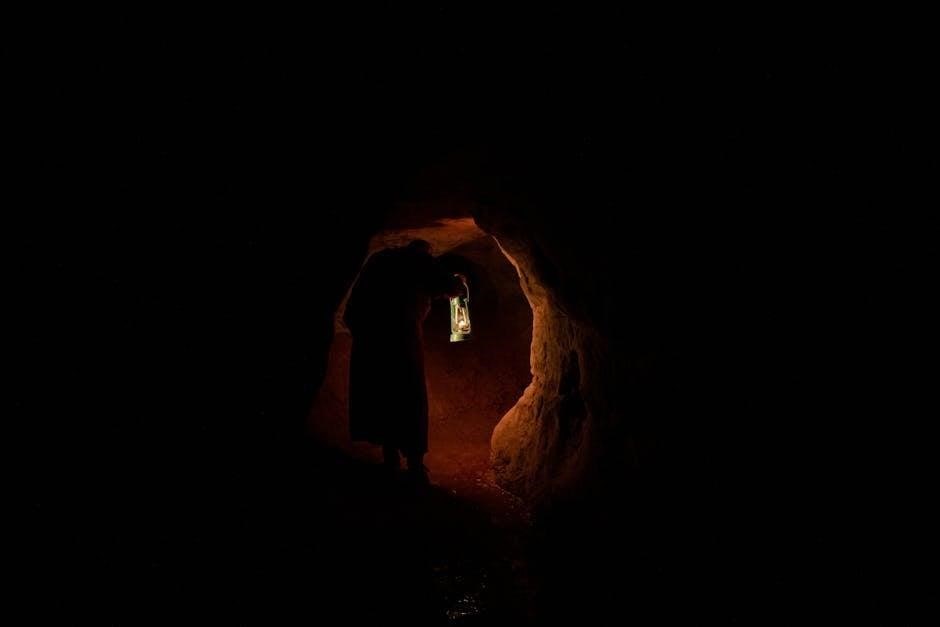Welcome to UCSC and the 2004 Disorientation Guide, a critical alternative to the glossy brochures. This guide aims to dispel illusions about campus life, offering a realistic perspective on university experiences and encouraging students to think critically about their environment. It is part of a tradition of guides created to empower students with knowledge and inspire activism.
1.1 Purpose of the Guide
The 2004 UCSC Disorientation Guide was created to challenge mainstream narratives about university life. Its purpose is to provide students with a critical perspective, encouraging them to question the status quo. By addressing issues like corporate ties, social justice, and campus bureaucracy, the guide aims to empower students with knowledge. It seeks to dismantle illusions about UCSC, fostering a community that values activism and critical thinking. The guide is a tool for students to navigate their academic journey with awareness and to engage meaningfully with the broader social and political context of their education.
1.2 Key Themes and Objectives
The 2004 UCSC Disorientation Guide emphasizes critical perspectives on university life, challenging mainstream narratives. Key themes include exposing corporate and military ties to the university, highlighting social justice movements, and addressing campus bureaucracy. The guide aims to empower students by fostering awareness of these issues and encouraging activism. It seeks to provide tools for navigating UCSC’s complex environment while promoting a deeper understanding of the university’s role in broader social and political contexts. By focusing on these themes, the guide equips students to engage critically with their education and community.
1.3 Structure of the Guide
The 2004 UCSC Disorientation Guide is organized into clear sections to help students navigate its content effectively. It begins with an introduction to the guide’s purpose and themes, followed by historical context about UCSC’s founding and its radical history. Subsequent sections explore student movements, corporate ties, and life at the university, offering critical perspectives. The guide also covers progressive planning and concludes with a call to action. Each section is designed to challenge mainstream narratives, providing students with tools for critical engagement and empowerment. This structure ensures a comprehensive understanding of UCSC’s complexities and encourages active participation in campus life.

Historical Context of UC Santa Cruz
Founded in 1965, UC Santa Cruz emerged as an experimental liberal arts campus, embodying radical ideals and a history of social justice movements.
2.1 Founding Principles of UCSC
UC Santa Cruz was established in 1965 as a bold experiment in liberal arts education within the UC system. Its founding principles emphasized innovation, interdisciplinary learning, and a departure from traditional campus structures. The campus was designed to foster a collaborative environment, with an emphasis on small colleges that promoted intimate academic settings. This experimental approach aimed to challenge conventional academic hierarchies and create a space for progressive thinking and student engagement. These principles continue to shape UCSC’s identity as a hub for critical inquiry and social change.
2.2 The Experimental Liberal Arts Campus
UC Santa Cruz emerged as an experimental liberal arts campus, breaking away from the UC system’s traditional models. Its design featured small residential colleges, each with unique themes, fostering tight-knit communities and interdisciplinary learning. This structure aimed to challenge conventional hierarchies and create a collaborative environment. The campus emphasized innovative education, blending arts and sciences in a way that encouraged students to think critically and creatively. This experimental approach continues to define UCSC’s identity, setting it apart as a progressive institution focused on student engagement and academic innovation.
2.3 Radical History and Social Justice Movements
UC Santa Cruz has a rich history of radical activism and social justice movements. Founded in 1965, the campus emerged as a space for challenging white supremacy and patriarchy. The Free Speech Movement and anti-war protests left a lasting impact, shaping the university’s identity. Students have consistently organized around issues like racial justice, labor rights, and gender equality. The growing movement for social justice continues to inspire activism, with the administration often facing criticism for its response to protests. This radical legacy is central to UCSC’s story, influencing both campus culture and the broader community.

The Role of Student Movements at UCSC
Student movements at UCSC have historically played a pivotal role in shaping campus culture and advocating for systemic change. Through activism, students challenge authority, promote social justice, and create meaningful impact, leaving a lasting legacy of resistance and progress.
3.1 The Free Speech Movement and Its Impact
The Free Speech Movement, originating at UC Berkeley, influenced UCSC’s activist culture. It challenged restrictions on political expression, empowering students to demand rights and question authority. The movement highlighted the importance of free speech in academia, leading to policy changes and fostering a legacy of student activism. By addressing censorship and promoting dialogue, it laid the groundwork for future social justice efforts, inspiring students to engage in transformative change and advocate for their rights within and beyond the university.
3.2 Anti-War Activism and Student Protests
Anti-war activism has long been a significant part of UCSC’s student movement history. The 2004 Disorientation Guide highlights how students actively engaged in protests against war, organizing events like teach-ins and demonstrations. These efforts aimed to raise awareness about the impact of military actions and advocate for peace. The guide emphasizes the importance of student involvement in such movements, encouraging individuals to question and challenge systemic injustices. By participating in anti-war activism, UCSC students contributed to a broader culture of resistance and social justice, aligning with the university’s radical history of student-led change and advocacy.
3.3 The Growing Movement for Social Justice
The 2004 UCSC Disorientation Guide reflects the growing movement for social justice among students and faculty. It highlights how UCSC has historically been a hub for radical activism, with students organizing around issues of race, gender, and economic inequality. The guide emphasizes the importance of collective action and solidarity, encouraging students to engage in movements that challenge systemic oppression. By addressing these issues, the guide serves as a resource for fostering critical awareness and empowering students to become active participants in creating a more just and equitable society. Its focus on social justice aligns with UCSC’s legacy of progressive activism and change.

The Connection Between Corporate Interests and UCSC
The 2004 UCSC Disorientation Guide examines the influence of corporate and military interests on the university, highlighting ties that shape research, policies, and campus life, urging critical awareness.
4.1 Investigating Corporate Ties to the University
The 2004 UCSC Disorientation Guide encourages students to investigate the deep connections between corporate interests and the university. It highlights how corporations influence research, funding, and campus policies, often aligning with their own agendas rather than student or public interests. The guide points out that university planners and decision-makers often hold ties to corporate or military entities, raising ethical concerns. By examining these relationships, students can better understand how external forces shape their education and campus life, fostering a critical perspective on the role of corporate power in academia.
4.2 Military Interests and Their Influence
The 2004 UCSC Disorientation Guide sheds light on the significant influence of military interests at the university. It reveals how military funding often shapes research priorities, favoring projects with defense applications over public-interest initiatives. The guide criticizes the collaboration between UCSC and military entities, which can lead to ethical dilemmas and undermine academic freedom. By exposing these ties, the guide encourages students to question how military interests impact campus life and academic agendas, promoting a more critical understanding of the university’s role in broader societal structures and power dynamics.
4.3 The Role of University Planners and Decision-Makers
The 2004 UCSC Disorientation Guide examines the pivotal role of university planners and decision-makers in shaping campus policies and priorities. It highlights how these individuals, often influenced by external interests, can steer the university toward agendas that may not align with its founding principles of social justice and accessibility. The guide critiques the lack of transparency in decision-making processes and advocates for greater student and community involvement. By scrutinizing the power dynamics at play, the guide encourages students to hold planners accountable and demand a university that truly serves the public good rather than corporate or military interests.

The Disorientation Guide’s Perspective on University Life
The 2004 UCSC Disorientation Guide offers a critical perspective on university life, challenging illusions about campus experiences and encouraging students to navigate the system with awareness and activism.
5.1 Dispelling Illusions About Campus Life
The 2004 UCSC Disorientation Guide challenges the glossy, idealized portrayals of campus life, revealing the realities of corporate ties, social justice struggles, and bureaucratic complexities. It prepares students for the contradictions between the university’s marketing and the actual experiences they will encounter. By addressing issues like administration decisions, student activism, and academic pressures, the guide empowers students to navigate UCSC critically. It encourages them to question the status quo and engage with the campus community thoughtfully, fostering a deeper understanding of the university’s role in their lives and the world at large.
5.2 Setting Boundaries and Expectations
The 2004 UCSC Disorientation Guide emphasizes the importance of setting clear boundaries and realistic expectations for campus life. It encourages students to communicate their limits and priorities, fostering personal and academic well-being. By challenging idealized portrayals of university experiences, the guide helps students anticipate and navigate potential challenges. This section provides practical advice on balancing academic responsibilities, social engagements, and personal growth, while also highlighting the need for self-care and assertiveness. It empowers students to define their own expectations and boundaries, ensuring a more fulfilling and intentional time at UCSC.
5.3 Navigating the UCSC Bureaucracy
Navigating UCSC’s bureaucracy can be challenging due to its complex administrative structures and decision-making processes. The 2004 Disorientation Guide highlights the importance of understanding these systems to advocate for oneself effectively. It encourages students to stay informed about university policies and to know where to seek help when facing administrative hurdles. The guide also emphasizes the need to question and challenge decisions that may not align with student interests. By fostering awareness of these dynamics, the guide empowers students to navigate the bureaucracy with confidence and advocate for their needs within the campus community.

Progressive Planning and Social Change
Progressive planning at UCSC emphasizes critical thinking, community engagement, and activism to foster social change, encouraging students to challenge systems and advocate for a more equitable future.

6.1 Key Topics for Progressive Planning
Progressive planning at UCSC focuses on addressing systemic inequalities, corporate ties, and military influence. It emphasizes the importance of cross-cultural awareness, trauma-informed practices, and interrupted learning impacts. The guide highlights the need for students to engage in activism, challenge university policies, and advocate for social justice. By exploring these key topics, students are empowered to create meaningful change and navigate the complexities of campus life critically. This section underscores the importance of collective action and critical thinking in fostering a more equitable and just university environment.
6.2 The Importance of Cross-Cultural Awareness
Cross-cultural awareness is vital for fostering an inclusive and equitable campus environment. The 2004 UCSC Disorientation Guide emphasizes understanding diverse backgrounds, experiences, and perspectives to build solidarity and collaboration. By recognizing power dynamics and systemic inequalities, students can engage in meaningful dialogue and activism. This awareness also addresses the impacts of trauma and interrupted learning, ensuring all students thrive academically and socially. The guide encourages empathy, respect, and active listening to create a supportive community. These principles are essential for empowering students to advocate for social justice and contribute to progressive change at UCSC and beyond.
6.3 Trauma, Interrupted Learning, and Student Success
Trauma and interrupted learning significantly impact student success, particularly for those navigating systemic inequities. The 2004 UCSC Disorientation Guide highlights how these challenges can stem from personal experiences, societal structures, or academic environments. It emphasizes the importance of recognizing and addressing these barriers to create inclusive spaces for healing and growth. By fostering cross-cultural awareness and providing resources, the guide encourages students to support one another and advocate for equitable learning conditions. Addressing trauma and interrupted learning is crucial for empowering students to thrive academically and personally, ensuring their success at UCSC and beyond.
The 2004 UCSC Disorientation Guide challenges students to think critically about their education and environment. It encourages empowerment through awareness, activism, and community engagement, inspiring lasting change.
7.1 Empowering Students for Change
The 2004 UCSC Disorientation Guide emphasizes the importance of empowering students to become active agents of change. By providing critical perspectives on university life, corporate ties, and social justice, the guide equips students with the knowledge and tools necessary to challenge systemic issues. It encourages students to engage in activism, question authority, and participate in movements that promote equity and justice. Through this empowerment, students are inspired to create meaningful impact both on campus and beyond, fostering a culture of critical awareness and collective action for a more just future.
7.2 The Legacy of the 2004 Disorientation Guide
The 2004 UCSC Disorientation Guide left a lasting impact as a catalyst for student activism and critical thinking. It challenged the status quo by exposing corporate and military ties to the university, inspiring future generations to question power structures. The guide’s emphasis on social justice and progressive planning created a blueprint for resistance and community engagement. Its legacy endures as a resource for empowering students to challenge inequities and advocate for systemic change, remaining a vital part of UCSC’s history of radical activism and commitment to social justice.
7.3 Moving Forward with Critical Awareness
Moving forward with critical awareness involves empowering students to challenge systems of oppression and advocate for transformative change. The guide emphasizes the importance of cross-cultural understanding and collective action to address systemic inequities. By fostering a community of informed and engaged individuals, UCSC can cultivate a culture of resistance and innovation. Students are encouraged to stay informed, question authority, and participate in movements that promote social justice and sustainability. Critical awareness is not just a mindset but a tool for creating a more equitable and just future for all members of the university and broader society.